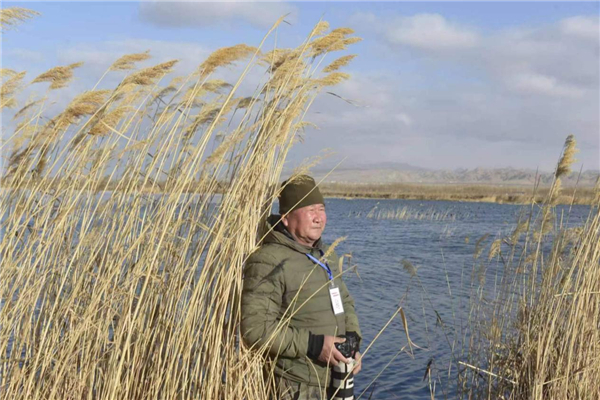Ecological efforts at Wuliangsu Lake spark attention

Luo Yuezhong observes birds at the Wuliangsu Lake Wetland Nature Reserve. [Photo provided to chinadaily.com.cn]
Wuliangsu Lake is a vast area that serves as a habitat and breeding ground for birds. The lake is located in North China's Inner Mongolia autonomous region. It covers an area of 293 square kilometers, making it one of the most extensive freshwater wetlands in China's Yellow River basin and one of the eight largest freshwater lakes in the country.
Significant conservation efforts have been put in place in recent years to improve the lake's water quality and overall ecological state, resulting in an increase in the number of birds present.
According to the reports of the Chinese News Agency, over 260 bird species, totaling more than 6 million birds, now either migrate through or breed at Wuliangsu Lake.
In particular, the lake has become an ideal habitat for the Mute Swan, a species under the second-class protection of the country.
During the spring season, many single Mute Swans aged 2 to 3 years old migrate north and arrive at Wuliangsu Lake to find their mate and build nests among the reed beds.
According to conservationists at the Wuliangsu Lake Wetland Nature Reserve, the improved water quality at the lake is vital to attracting migratory birds like the Mute Swan, whose high standards for water quality demand such an environment.
Approximately 600 pairs of Mute Swans breed and reproduce in the wetlands of the lake during May each year, making it an important breeding site for this endangered species.
Environmental conservationist Luo Yuezhong, dedicatedly observing, inspecting, and recording bird data, spends over 300 days each year observing bird movements at different locations within the Wuliangsu Lake Wetland Nature Reserve.
In August 2022, Luo rescued an injured Mute Swan, naming it "Yueyue" and taking care of it until it could be released back into its natural habitat.
Upon Yueyue's recent return to Wuliangsu Lake on March 16 this year, Luo felt great relief. He has spent the last 10 years closely following the Mute Swan's breeding and nesting activities and the emergence of new chicks. Watching Yueyue's family thrive in their natural habitat fills him with great satisfaction.
On the noon of March 31, Luo and other volunteers fitted six rescued Mute Swans with rings and released them into Wulangsu Lake. Where will the swans fly this time, and if they come back, have inspired his curiosity.



 Print
Print Mail
Mail


